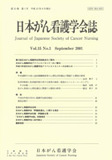Japanese
English
- 販売していません
- Abstract 文献概要
- 参考文献 Reference
要 旨
造血器疾患は寛解後も長期にわたる治療が必要であり,患者の心理社会的適応への対応は重要である.本研究は,外来通院中の成人造血器腫瘍患者の適応を職業,家庭,社会活動,情緒の4側面から総合的にとらえ,関連する要因を特定することを目的とした.
都内の5つの病院において,調査期間中に血液内科外来を受診した20〜60歳の造血器腫瘍患者112名のうち,研究参加の承諾が得られた者に対して調査を行い,102名から有効回答を得た.質問紙の内容は家族構成や仕事の状況,疾患についての認知的評価,対処方法,心理社会的適応などである.疾患等に関する情報は医師又はカルテから得た.
全般的には,各変数は適応の各側面に対し,同じ方向で関連していた.すなわち,疾患についての肯定的な評価,仕事の変化が少ないこと,自覚症状が少ないこと,発症からの期間が長いこと,肯定的な対処方法がよい適応と関連していた.一方,職業上適応は入院が短いほど良好であったのに対し,社会活動適応は逆の関連を示した.他にも,年齢や家族構成などは,適応の各側面によって異なる関連性を示した.
本研究により,心理的適応を多面的にとらえる意義が再確認された.アセスメントにより早期に適応不良のリスクを多側面から予測して,個々の患者に応じた対応を行う必要性,および症状コントロールや疾患に対する肯定的な意味づけを促進するような介入の有用性が示唆された.
Abstract
Patients with hematological malignancies, such as leukemia and malignant lymphoma must undergo treatment for long periods of time even after complete remission has been achieved. Thus, it is important to improve their psychosocial adjustment. The present study examined the psychosocial adjustment of adult outpatients with hematological malignancies from a multi-dimension viewpoint (i. e. vocational, social, domestic, and emotional). We also investigated the various factors related to adjustment.
Of 112 patients (age range, 20 to 60 years) attending the hematology ambulatory services of five different hospitals, 102 participated in the present study. Each patient filled out a questionnaire regarding their work status, living arrangements, appraisal of illness, coping strategy, and multi-dimensional psychosocial adjustment. Information regarding their disease, including the stage of illness and duration of hospitalization was taken from the patient's medical records.
Many of the variables showed the same relationship with the various dimensions of adjustment. In particular, better adjustment was related to a more positive appraisal of illness, less change in work, fewer subjective symptoms, a longer duration of suffering, and a positive coping strategy. On the other hand, certain variables were related to the subscales differently. For example, a shorter duration of hospitalization was related to a better vocational adjustment but a worse social adjustment. The same pattern was seen with age and living arrangements.
The present study confirmed the importance of helping adult outpatients with hematological malignancies with their psychosocial adjustment from a multi-dimension viewpoint. We need to understand each patient's risk of maladjustment early and deal with any specific problems from various viewpoints. The results also suggested the benefits of intervention in achieving symptom control and a positive appraisal of the illness.
Copyright © 2001, Japanese Society of Cancer Nursing All rights reserved.


